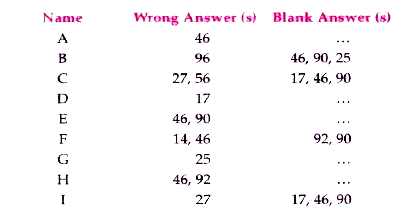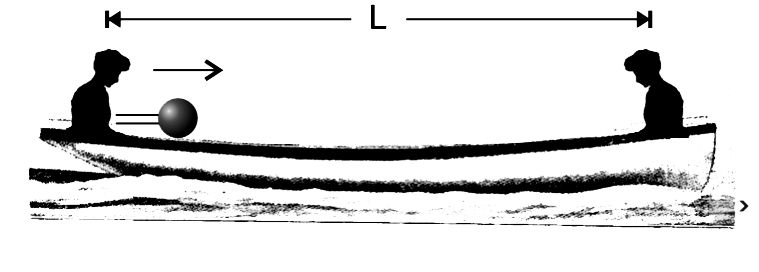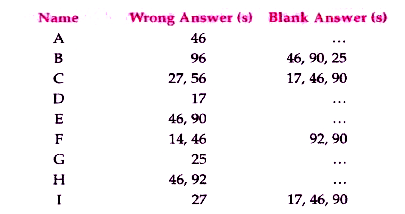A placed three sheets with two carbons to get two extra copies of the original. Then he decided to get more carbon copies and folded the paper in such a way that the upper half of the sheets were on top of the lower half. Then he typed. How many carbon copies did he get?
1
2
3
4
The correct Answer is:B
According to the question
The total number of carbons = 2
So, required number of copies obtained = 2
[∵ number of copies = number of carbons]
Topper's Solved these Questions
- BOOK - LUCENT PUBLICATIONCHAPTER - MATHEMATICAL ABILITY AND REASONINGEXERCISE - EXERCISE (Type-II: Figure Based Problems)5videos
MATHEMATICAL ABILITY AND REASONING
- BOOK - LUCENT PUBLICATIONCHAPTER - MATHEMATICAL ABILITY AND REASONINGEXERCISE - EXERCISE (Type-III: Age Based Problems)11videos
MATHEMATICAL ABILITY AND REASONING
- BOOK - LUCENT PUBLICATIONCHAPTER - MATHEMATICAL ABILITY AND REASONINGEXERCISE - EXERCISE (Type-VI: Puzzle Based Problem)22videos
MATHEMATICAL ABILITY AND REASONING
- BOOK - LUCENT PUBLICATIONCHAPTER - LOGICAL VENN DIAGRAMS EXERCISE - EXERCISE -43videos
LOGICAL VENN DIAGRAMS
- BOOK - LUCENT PUBLICATIONCHAPTER - MATHEMATICAL OPERATIONS EXERCISE - EXERCISE-334videos
MATHEMATICAL OPERATIONS
Similar Questions
Read the passage given below and answer the questions that follow:
On horse and on Foot
This is how Ibn Battuta describes the postal system:
In India the postal system is of two kinds. The horse post, called ulug, is run by royal horses stationed at a distance of every four miles. The foot-post has three stations per mile, it is called dawa, that is one-third of a mile... Now, at every third of a mile there is a well-populated village, outside which are three pavilions in which sit men with girded loins ready to start. Each of them carries a rod, two cubits in length, with copper bells at the top. When the courier starts fromm the city he holds the letter in one hand and the rod with its bells on the other, and he runs as fast as he can. When the men in the pavilion hear the ringing of the bell they get ready. As soon as the courier reaches them, one of them takes the letter from his hand and runs at top speed shaking the rod all the while until he reaches the next dawa. And the same process continues till the letter reaches its destination. This foot-post is quicker than the horse-post, and often it is used to transport the fruits of Khurasan which are much desired in India.
How did the state encourage the merchant in the 14th century? Write two ways.View SolutionA boy appears for 5 papers , each of the same number of maximum marks .He scores in each of the papers in the ratio of 6:7:8:9:10 .If his average score in all the five papers together was 60% , then in how many papers did he get more than 50% marks ?
View Solution
Knowledge Check
- Question 1 - Select One
Father is aged three times more than his son Ronit. After 8 years, he would be two and a half times of Ronit's age. After further next 8 years, how many times would he be of Ronit's age ?
A2 timesB212 timesC234 timesD3 times - Question 2 - Select One
A number of saplings are lying at a place by the side of a straight road. These are to be planted in a straight line at a distance interval of 10 meters between two consecutive saplings. Mithilesh, the country's greatest forester, can carry only one sapling at a time and has to more back to the original point to get the next sapling. In this manner he covers a total distance of 1.32 kms. How many saplings does he plant in the process if he ends at the starting point?
A15B14C13D12 - Question 3 - Select One
Study the information below and answer questions based on it.
Recently, the answers of a test held nation wide were leaked to a group of unscrupulous people. The investigative agency has arrested the mastermind and nine other people A, B, C, D, E, F, G, H and I in this matter. Interrogating them, the following facts have been obtained regarding their operation. Initially the mastermind obtains the correct answer-key. All the others create their answer-key in the following manner. They obtain the answer key from one or two people who already possess the same. The people are called his/her "sources". If the person has two sources, then he/she compares the answer-keys obtained from both sources. If the key to a question from both sources is identical, it is copied, otherwise it is left blank. If the person has only one source, he/she copies the source's answers into his/her copy. Finally, each person compulsorily replaces one of the answers (not a blank one) with a wrong answer in his/her answer key.
The paper contained 200 questions, so the investigative agency has ruled out the possibility of two or more of them introducing wrong answers to the same question. The investigative agency has a copy of the correct answer key and has tabulated the following data. These data represent question numbers.

Both G and H were sources toAFBBCIDNone of these
Mukesh has a box of 24 pencils. He give half of them to Sunita. How many does Sunita get? How many does Mukesh still have?
View SolutionSuppose your father has brought a big of chocolates. He divided it into two equal pieces and gave one piece to you. You wanted to share it with two your friends. You divided your piece of chocolate into three equal piece. How much did each of you get?
View SolutionLaila and Majnu are on a boat for a picnic. The boat is initially at rest. Laila has a big watermelon which she throws towards Majnu. The man catches the melon and eats half of it. He throws back the remaining half to Laila. She eats the half of the melon that she receives & throws the remaining part to Majnu. Majnu again eats half of what he receives and returns the remaining part back to Laila. This continues till the melon lasts. The two are sitting at the two ends of the boat which has a length L. Combined mass of the boat and the two lovers is M0 and the mass of the water melon is M. Assume that the boat can move horizontally on water without any resistive force. Find the displacement of the boat when the watermelon gets finished.
 View Solution
View SolutionStudy the information below and answer questions based on it.
Recently, the answers of a test held nation wide were leaked to a group of unscrupulous people. The investigative agency has arrested the mastermind and nine other people A, B, C, D, E, F, G, H and I in this matter. Interrogating them, the following facts have been obtained regarding their operation. Initially the mastermind obtains the correct answer-key. All the others create their answer-key in the following manner. They obtain the answer key from one or two people who already possess the same. The people are called his/her "sources". If the person has two sources, then he/she compares the answer-keys obtained from both sources. If the key to a question from both sources is identical, it is copied, otherwise it is left blank. If the person has only one source, he/she copies the source's answers into his/her copy. Finally, each person compulsorily replaces one of the answers (not a blank one) with a wrong answer in his/her answer key.
The paper contained 200 questions, so the investigative agency has ruled out the possibility of two or more of them introducing wrong answers to the same question. The investigative agency has a copy of the correct answer key and has tabulated the following data. These data represent question numbers.

Which of the following statements is true ?View SolutionMy worries were increasing. The boy at the shop was becoming more clamorous. My sales were poor, as the railways were admitting more pedlars on the platforms. My cash receipts were going down and my credit sales alone flourished. The wholesale merchants who supplied me with goods stopped credit to me. The boy's method of accountkeeping was so chaotic that I did not know whether I was moving forward or backward. He produced cash from the counter in a haphazard manner, and there were immense gaps on the shelves all over the shop. The complaint by the public was that nothing one wanted was ever available. Suddenly the railways gave me notice to quit. I pleaded with the old stationmaster and porter, but they could do nothing: the order had come from high up. The shop was given to a new contractor. I could not contemplate the prospect of being cut off from the railways. I grew desperate and angry. I shed tears at seeing a new man in the place where I and my father had sat. I slapped the boy on the cheek and he cried, and his father, the porter, came down on me and said, 'this is what he gets for helping you! I'd always told the boy - He was not your paid servant, anyway.'
How did the boy's method of account-keeping affect the speaker ?View Solution

